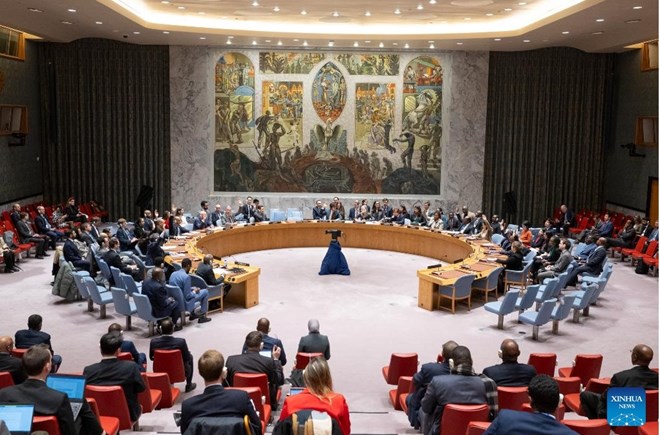
Friday December 13, 2024
FILE - Representatives vote on a draft resolution during a Security Council meeting at UN headquarters in New York, on Dec. 1, 2023. (Eskinder Debebe/UN Photo/Handout via Xinhua)
Mogadishu (HOL) — The United Nations Security Council is set to vote on Friday, December 13, on a resolution to renew sanctions targeting Al-Shabaab, Somalia’s most dangerous militant group. The proposed measures aim to disrupt the group’s financing and arms supply chains while addressing emerging threats, including piracy and the expansion of rival militant factions.
The resolution, spearheaded by the United Kingdom, seeks to extend the Al-Shabaab sanctions regime until February 2025. It includes measures such as bans on illicit arms imports, charcoal exports—a major revenue stream for the group—and improvised explosive device (IED) components.
Despite sustained counterterrorism efforts, Al-Shabaab remains a formidable threat to Somalia’s stability and security. According to the October 2023 report by the UN Panel of Experts, the group maintains its operational strength through a combination of tactics. It seizes weapons and supplies during attacks on the Somali National Army (SNA) and African Union bases, ensuring a steady flow of arms despite embargoes. Al-Shabaab also derives significant revenue from illegal taxation and extortion in the areas it controls, bolstering its financial resources. Additionally, the group leverages regional arms trafficking networks to replenish its stockpiles and sustain operations.
The resurgence of Somali piracy is an alarming development, with over 25 incidents reported since November 2023. The uptick recalls a crisis that once disrupted global shipping routes, raising fears of another surge in maritime crime.
The situation is compounded by the rise of ISIL-Somalia, a splinter group operating from Puntland. The faction, now estimated at 600-700 fighters, has expanded its influence through an influx of foreign militants.
Additionally, the PoE claims to have uncovered evidence of cooperation between Al-Shabaab and Yemen’s Houthi rebels. The alliance reportedly involves arms smuggling.
Somalia’s federal government has expressed strong support for the sanctions, emphasizing their importance in undermining Al-Shabaab’s networks. President Hassan Sheikh Mohamud recently highlighted the role of international collaboration in addressing the group’s financing and supply chains.
Last year, the UN Security Council lifted its decades-old arms embargo on Somalia’s federal government, a move seen as a milestone for the country’s defence capabilities. However, challenges persist in extending weapons management frameworks to federal member states and addressing arms held by clan militias and civilians.
The draft resolution has undergone extensive negotiations among Security Council members. The UK initially proposed a shorter extension to allow more detailed discussions on Somalia’s post-ATMIS security arrangements. However, the U.S. and China pushed for a longer timeframe to avoid procedural congestion in early 2025. Russia’s concerns over the composition of the PoE led to revisions, granting the sanctions committee the authority to review the panel’s membership by January.
If adopted, the resolution will reinforce international efforts to weaken Al-Shabaab while addressing emerging challenges such as piracy and ISIL-Somalia’s expansion. The Security Council plans to review the sanctions regime and the PoE’s mandate in early 2025, considering Somalia’s progress in weapons management and counterterrorism operations.